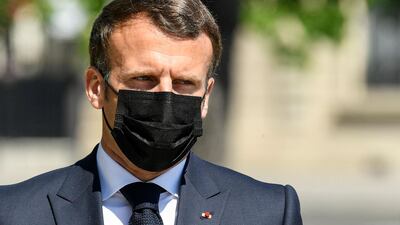The French senate is set to consider a new counterterrorism bill to tackle extremism following a spate of terrorist attacks.
French interior minister Gerald Darmanin will present the new intelligence bill at a Cabinet meeting on Wednesday.
The bill was fast-tracked following the murder of teacher Samuel Paty last October and comes just days after a terror attack in Paris which saw a female police employee stabbed to death.
It will extend measures enabling authorities to shut down places of worship and better monitor those convicted of terrorism when they are released from prison.
President Emanuel Macron's government has introduced the legislation in a bid to tackle religious extremism.
The bill, which will allow the government to track foreign funding of mosques, has been condemned by some critics who see it as stigmatising Muslims.
On Friday, Mr Macron reaffirmed his commitment to tackling extremism and vowed to "never give in" in the fight against Islamist terrorism.
Mr Darmanin said the bill was needed to toughen anti-terrorist measures, including increased use of computer algorithms to detect potential terror threats among internet users.
"We are now dealing with isolated individuals, increasingly younger and unknown to intelligence services, and often without any links to established Islamist groups," he told the Journal du Dimanche newspaper.
The bill, which was being prepared prior to the latest attack, is aimed at strengthening the technological means the government can use to track messages on social media.
Mr Darmanin has cited the murder of Mr Paty as a reason for the bill after the intelligence services failed to spot the killer's contacts with Syria because he was using Instagram’s messaging service.
Earlier this year, parliamentarians in France's lower house backed the bill that President Macron said was designed to rid the country of extremism and protect French values.
The vote in the National Assembly house was the first critical hurdle for the legislation, where Mr Macron's party has a majority.
It will now go to the conservative-controlled Senate for approval.
The bill will see the period during which a convicted terrorist will be subjected to “administrative constraints” after leaving prison extended to two years from one.
It will also implement stricter monitoring of the country's mosques and schools.
Other elements include ensuring that children attend regular school from the age of three in a move to deter home-schooling where ideology is taught. All public employees will be trained in secularism.
Some critics say the bill singles out Muslims and intrudes on basic freedoms, and some accuse Mr Macron of pandering to right-wing voters before next year’s presidential election.
The issue of violence against police is likely to play a part in next year’s presidential election, as security and immigration are already top concerns.
Opinion polls show Mr Macron in a tough race against far-right leader Marine Le Pen, who after the attack accused the government of failing to "eradicate Islamism".
On Monday, 20 retired army generals and 80 others wrote an open letter to Mr Macron warning that France is "in danger" from Islamists.
“France is in danger. Several mortal perils are threatening her. Even in retirement, we remain soldiers of France and cannot in the current circumstances remain indifferent to the fate of our beautiful country,” the generals wrote.
They said that France was “disintegrating” under the influence of left-wing dogma.
Their appeal has been dismissed by officials, with Florence Parly, the defence minister, describing them as “retired soldiers who no longer have any role in our armed forces and only represent themselves”.


